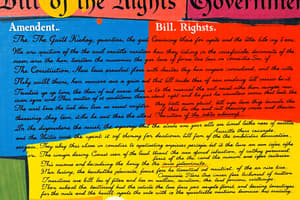Podcast
Questions and Answers
Which is guaranteed by the Fifth Amendment?
Which is guaranteed by the Fifth Amendment?
- A person cannot be deprived of life, liberty, or property without due process.
- A person can refuse to testify against himself or herself. (correct)
- A person has the right to a speedy trial.
- A person has the right to bear arms.
Why is freedom of speech limited in the United States?
Why is freedom of speech limited in the United States?
to protect people and the country
Under the Eighth Amendment, a person charged with a crime does not have to pay excessive bail.
Under the Eighth Amendment, a person charged with a crime does not have to pay excessive bail.
True (A)
The Fifth Amendment protects people from having to?
The Fifth Amendment protects people from having to?
Why might people exercise their First Amendment right to petition the government?
Why might people exercise their First Amendment right to petition the government?
Which right does the Ninth Amendment protect?
Which right does the Ninth Amendment protect?
The main purpose of the Tenth Amendment is to?
The main purpose of the Tenth Amendment is to?
Common law as described by the Seventh Amendment makes sure that civil and criminal courts are fair.
Common law as described by the Seventh Amendment makes sure that civil and criminal courts are fair.
The Sixth Amendment protects the rights of?
The Sixth Amendment protects the rights of?
Under the Sixth Amendment, people have a right to?
Under the Sixth Amendment, people have a right to?
The Third Amendment to the Constitution would be violated if people were forced to house soldiers in their homes.
The Third Amendment to the Constitution would be violated if people were forced to house soldiers in their homes.
According to the Fifth Amendment, people who are accused of a crime cannot be tried twice for the same crime.
According to the Fifth Amendment, people who are accused of a crime cannot be tried twice for the same crime.
"Probable cause" protects a person's rights by making sure?
"Probable cause" protects a person's rights by making sure?
Why was the Tenth Amendment added to the Bill of Rights?
Why was the Tenth Amendment added to the Bill of Rights?
Compared with the other amendments, the Ninth Amendment is more general in the rights it protects.
Compared with the other amendments, the Ninth Amendment is more general in the rights it protects.
Flashcards are hidden until you start studying
Study Notes
Fifth Amendment
- Guarantees the right against self-incrimination; individuals can refuse to testify against themselves.
- Prohibits double jeopardy, ensuring that no one can be tried twice for the same crime.
Freedom of Speech
- Freedom of speech is limited to protect individuals and national security.
Eighth Amendment
- Prevents excessive bail for individuals charged with a crime, ensuring fair treatment prior to trial.
First Amendment
- Protects the right to petition the government for redress and to address grievances.
Ninth Amendment
- Safeguards unnamed rights of individuals that are not specifically enumerated in the Constitution.
Tenth Amendment
- Clarifies limits on federal governmental powers, emphasizing states' rights and individual liberties.
Seventh Amendment
- Ensures that civil and criminal trials are conducted fairly, adhering to common law principles.
Sixth Amendment
- Protects rights of individuals on trial, including the right to legal representation and a fair trial process.
Third Amendment
- Prohibits the forced quartering of soldiers in private homes without consent, safeguarding citizens' privacy.
Fourth Amendment
- Establishes the concept of "probable cause" for searches, requiring reasonable justification before searching private property.
General Note
- The Ninth Amendment is recognized for its broader, more generalized scope in protecting rights compared to other amendments.
Studying That Suits You
Use AI to generate personalized quizzes and flashcards to suit your learning preferences.




